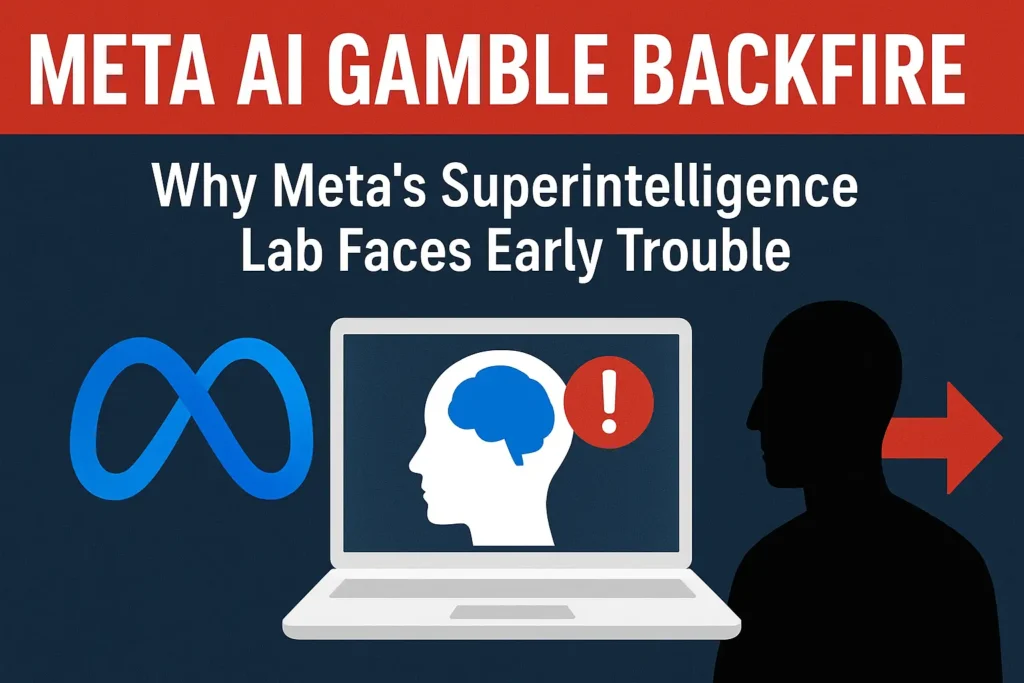
Meta’s bold bet on artificial intelligence may already be showing cracks. Just weeks after CEO Mark Zuckerberg announced the launch of Meta Superintelligence Labs (MSL), the ambitious project is struggling with a wave of employee departures. The exits raise doubts about whether Meta’s gamble on building “personal superintelligence” could turn into a costly misstep.
A Vision for Superintelligence
When Zuckerberg introduced MSL, he positioned it as a game-changing step in Meta’s mission to build artificial general intelligence (AGI). The goal was to create AI that goes beyond today’s chatbots and assistants, offering highly advanced, human-level reasoning that could eventually power Meta’s platforms like Facebook, Instagram, and the metaverse.
However, less than two months later, the lab is already facing serious challenges. Reports suggest that at least eight key employees have left, some of them longtime veterans who played critical roles in developing Meta’s AI infrastructure. For a project that requires top talent and stability, such departures hint at trouble brewing inside the company.
Veteran Talent Walking Away
The list of exits is striking. Bert Maher, who worked at Meta for 12 years, recently left to join Anthropic, a rising rival in the AI space. Tony Liu, who managed PyTorch GPU systems for over eight years, also departed to focus on his own newsletter about scaling AI systems.
Other names include Chi-Hao Wu, an AI specialist who became the chief AI officer at startup Memories.ai, and Aram Markosyan, a research scientist who focused on AI safety and fairness. Markosyan’s next career move is still unclear, but his departure further highlights the uncertainty inside MSL.
Rivals Benefiting From Meta’s Loss
Some of the biggest gains from these exits are going to OpenAI, Meta’s direct competitor in the race to dominate AI. Chaya Nayak, who previously served as Meta’s director of generative AI product management, has joined OpenAI to work on special initiatives. Similarly, senior staff engineer Afroz Mohiuddin, who joined Meta just last year, has also moved to OpenAI.
Even recent hires are leaving. Wired reported that Avi Verma and Ethan Knight, both of whom had very short stints at Meta, decided to return to OpenAI. Meanwhile, Rishabh Agarwal, who joined from Google DeepMind earlier this year, also announced his exit. In a post on X (formerly Twitter), Agarwal praised Meta’s “talent and compute density” but said he wanted to take “a different kind of risk.”
Why the Meta AI Gamble Backfire Is Concerning
For Meta, the timing couldn’t be worse. The company is heavily investing in AI to stay competitive against OpenAI, Google DeepMind, and Anthropic. But the early struggles of MSL suggest that Meta may not be offering the kind of environment that attracts or retains top talent.
Losing experienced engineers and researchers so quickly raises questions about the division’s leadership, vision, and long-term stability. If Meta cannot hold onto its best people, its dream of building personal superintelligence may remain out of reach.
What’s Next for Meta’s AI Push?
Zuckerberg has been vocal about making AI a central pillar of Meta’s future. From powering smarter social media tools to creating intelligent virtual assistants for the metaverse, the company is betting big on AI. But as this meta ai gamble backfire unfolds, it shows that even the biggest tech giants cannot escape the challenges of talent wars, internal competition, and strategic missteps.
Whether MSL can bounce back remains to be seen. For now, the high-profile exits serve as a warning sign that Meta’s ambitious AI dreams may face more turbulence before they deliver results

